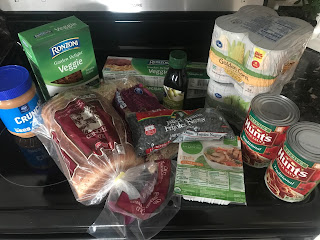Sunday was the final morning of the SNAP Benefit Challenge - one week of eating utilizing $1.40 per meal, an amount that people on SNAP Benefits (previously called food stamps) must do on a every meal, every day basis.
In looking back at the week, and the small glimpse into what hundreds of
thousands of people across the state call reality, I was struck by how much I
have to be grateful for.
The difference between myself and people in poverty is
largely life circumstance. I grew up with two parents, I never had to worry
where my next meal came from, I was able to go to college without taking on too
much debt, and I have always had a support system. The support system component
strikes me most.
Throughout the week, I did eat like someone on SNAP Benefits,
but nothing else in my life reflected the lifestyle that many people receiving
these benefits live. I had reliable transportation, a flexible and good job
that I could be a few minutes late to, without reprimand, if I hit traffic or
had to deal with a situation at home. I had reliable housing, heat during cold
nights, and ultimately, I had the choice to step away from the challenge at any
point in time. A choice that isn’t part of the equation for people receiving SNAP.
Was it hard? Yes. Did it make for difficult coffee meetings
and work receptions because I couldn’t accept free food? Yes. Did I long for
the moment I could have a cup of coffee again? More than anything else. I have
to admit that after a week, I was more than ready to be done and start living
my life the way I like to live it … which makes me feel like a privileged jerk.
Every time I wanted to cheat, I also wanted to smack myself.
The reality is hard, but I didn’t really live it.
I realized that one can live on food stamps without going
hungry, but to do it in a healthy way is a tall order. I usually base my meals
around fruits and vegetables, but during the challenge, I had a couple bananas,
some corn, and a little broccoli and cauliflower … all week. I wasn’t eating
junk food, but with a diet heavy in grains and light on veggies, fruit, and
protein, I felt tired and lethargic.
I spoke with a half dozen people who have been or are on
SNAP benefits, all with a story to tell. Some of their sentiments are below.
- You wonder why people in poverty are overweight? Look at what you can buy with food stamps.
- I cry when I go to the grocery store because what I now spend in a week is more than we used to spend in a month when I was growing up.
- I used SNAP as a supplement because I had other resources and family support.
- SNAP Benefits got me through a really hard time, but you can’t live off of them for long.
- My family grew up in the projects and my mom refused to be on food stamps – she had too much pride for it. It speaks to the stigma of poverty and hunger, that she wouldn’t take it, even when we really needed it.
My glimpse into life on SNAP Benefits was merely that. A
glimpse. A minor, unimportant glimpse. I do hope the dialogue and education
continues. If we don’t talk about it, how can we begin to untangle the issue
and begin to make a difference?
As we all move forward with our normal lives, let us not
forget that this way of life is a reality for many.
Let us remember that when we vote that we have power to
elect people to deal with social issues that create such ripple effects as
hunger does.
Let us remember compassion and understanding – and how to
extend it to others.
Let us remember that we have the power to create change, to share
important issues, and to empower others.
